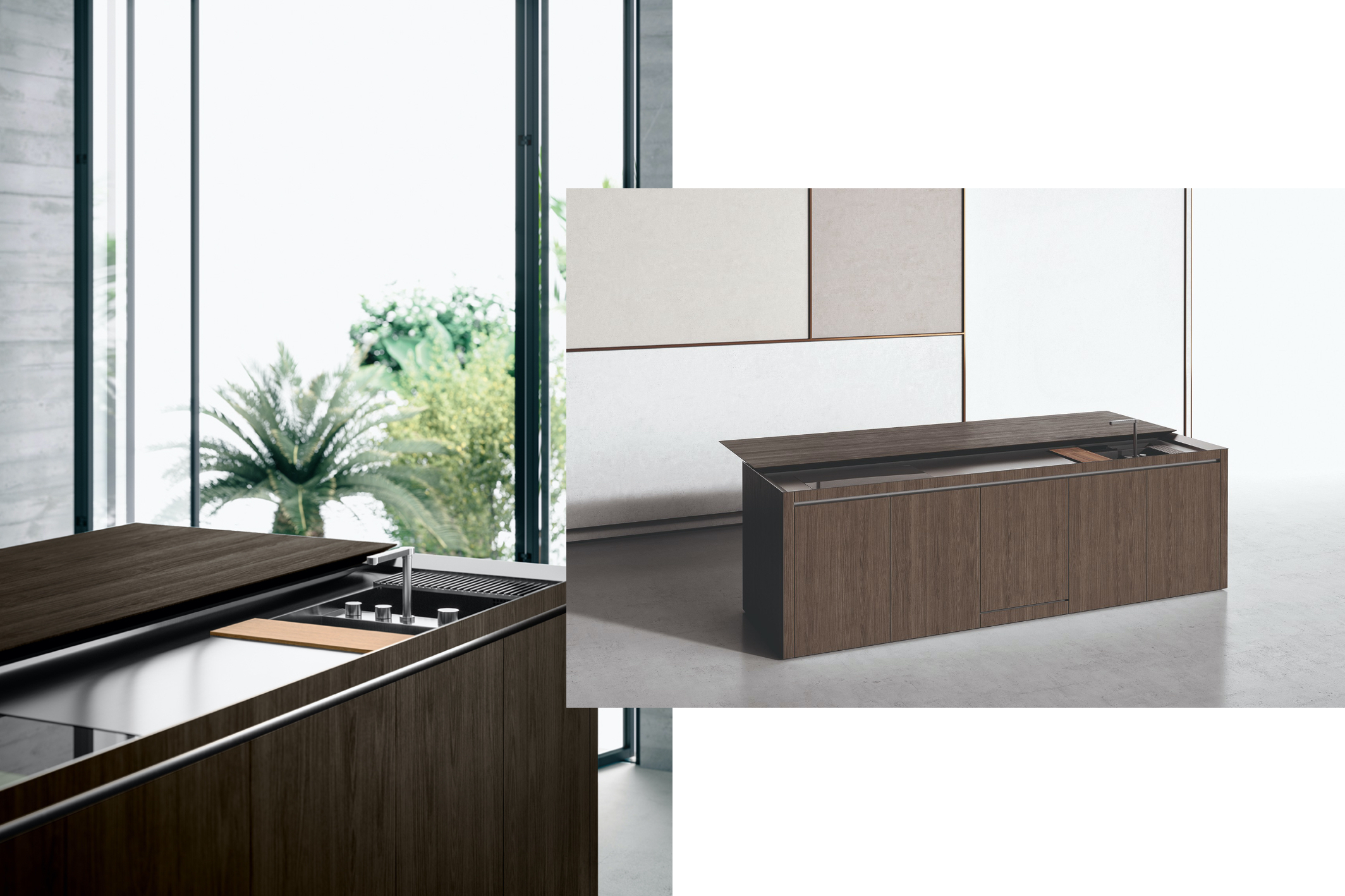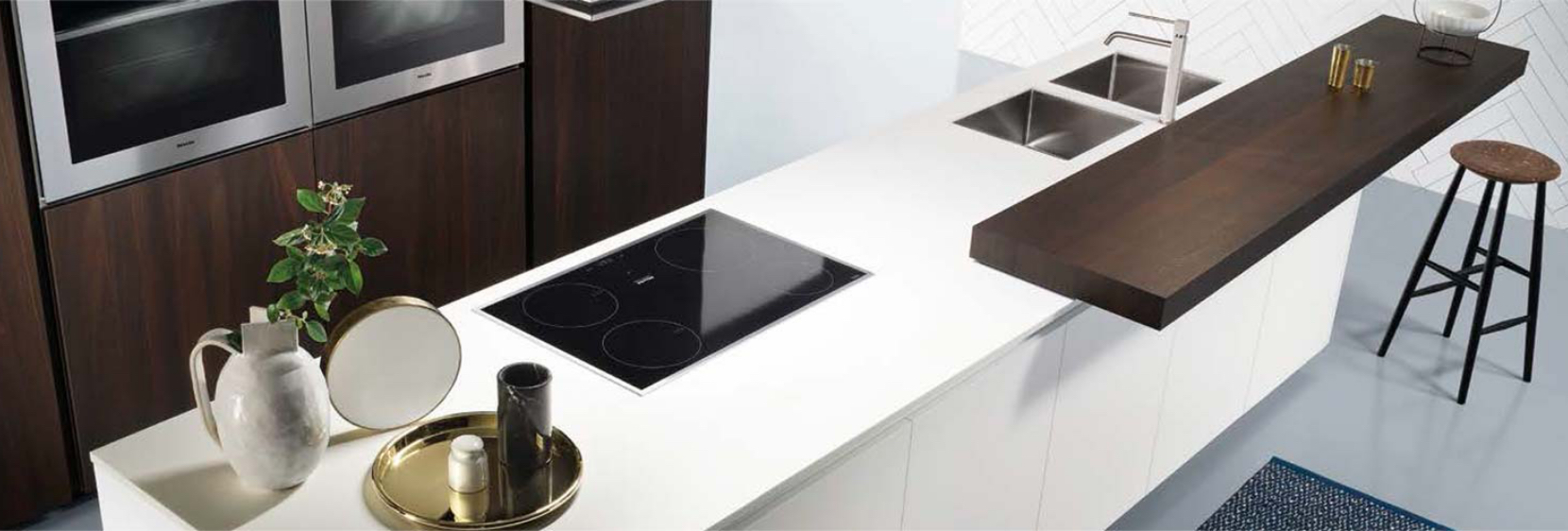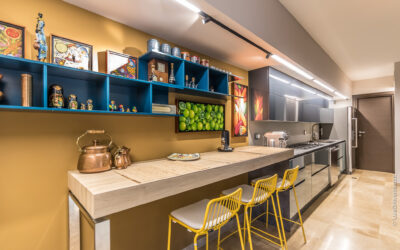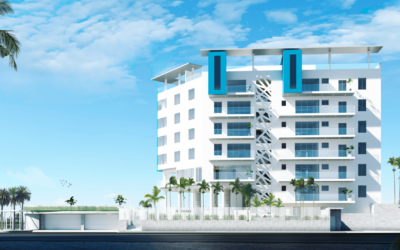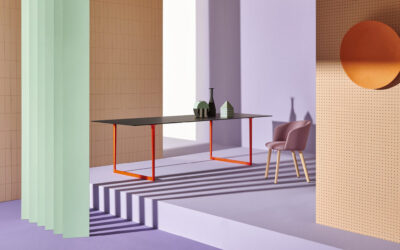NEWS
How to Select the Ideal Material for Your Kitchen Countertop
Referring to our vast experience in creating highly personalized spaces adapted to our clients’ tastes, we have concluded that the kitchen counter tends to be the essence of this space. The chosen materials generate distinct sensations depending on the selection: the warmth created by wood, the versatility of laminated surfaces, stone’s resistance and glass’ elegance. These are the foundations of your day to day activities in one of the most concurrent spaces for you and your family. As such, we have developed a short guide which is comprised of some of the most popular materials along with their advantages and disadvantages; to help you select the ideal one most suited to your needs.
Wood
Commercial Names (or Types): Wood doesn’t have a commercial name per se; but the ideal material for kitchen countertops are the oak, walnut and Iroko (African teak).
On top of guaranteeing a timeless look, wood provides a kitchen with warmth and comfort thanks to the naturalistic sensation transmitted by its aesthetic. It’s a classic option, filled with character which naturally adapts to any style, be it modern or traditional.
The main reason why wood continues to be selected despite its flaws is due to its appearance. Wood’s beauty is one of a kind, and meshes perfectly with all the established styles, guaranteeing that your spaces will always be following the latest trend. Nonetheless, wood requires a high level of care and time investment when compared to other materials, seeing as: spills need to be cleaned immediately to prevent them from seeping, placing heavy or hot objects must be avoided and it must be greased with regularity to maintain its pristine condition, among others.
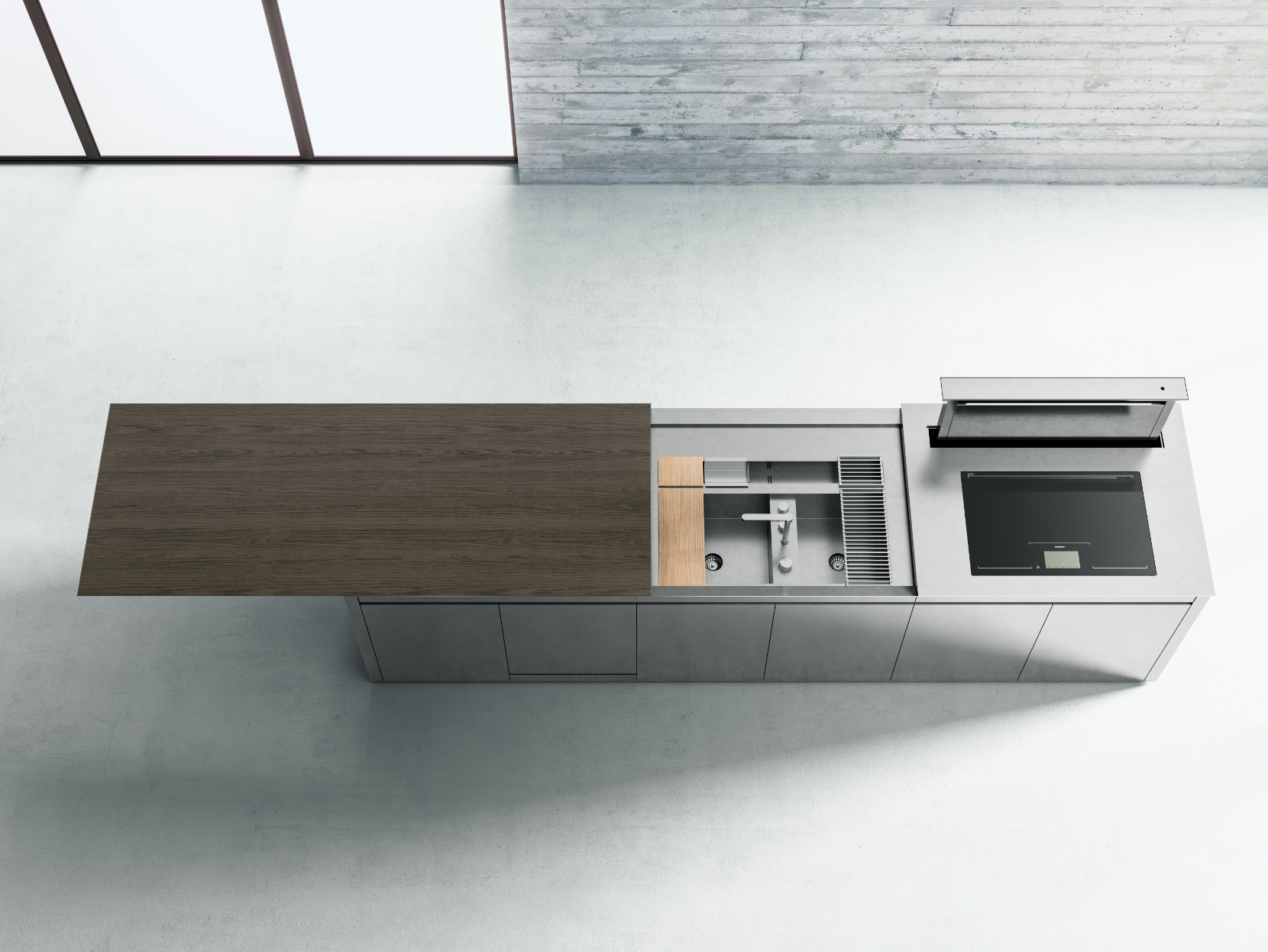
K5 Kitchen, Boffi. Oak Kitchen Countertop
PROS
- Attractive aesthetic
- Easy repair
- When properly sealed, it is naturally hygienic
- Relatively cheap
Cons
- Must be sealed annually
- High level of maintenance
- Susceptible to stains, bruises, marks and scratches.
Granite
Commercial Names (or Types): Granite has no specific commercial name and there is a wide variety of styles and colors in the market.
Granite is one of the most renowned and utilized materials for kitchen counters. Not only are they incredibly exquisite and timeless, but this natural stone is one of the most resistant materials in existence; offering functionality and durability in a kitchen of high demand.
Despite granite’s cost and installation being considerable, natural stones offer an exceptional aggregate value to any kitchen; in addition to the fact that no granite is exactly the same as another, providing a singular uniqueness to any space.
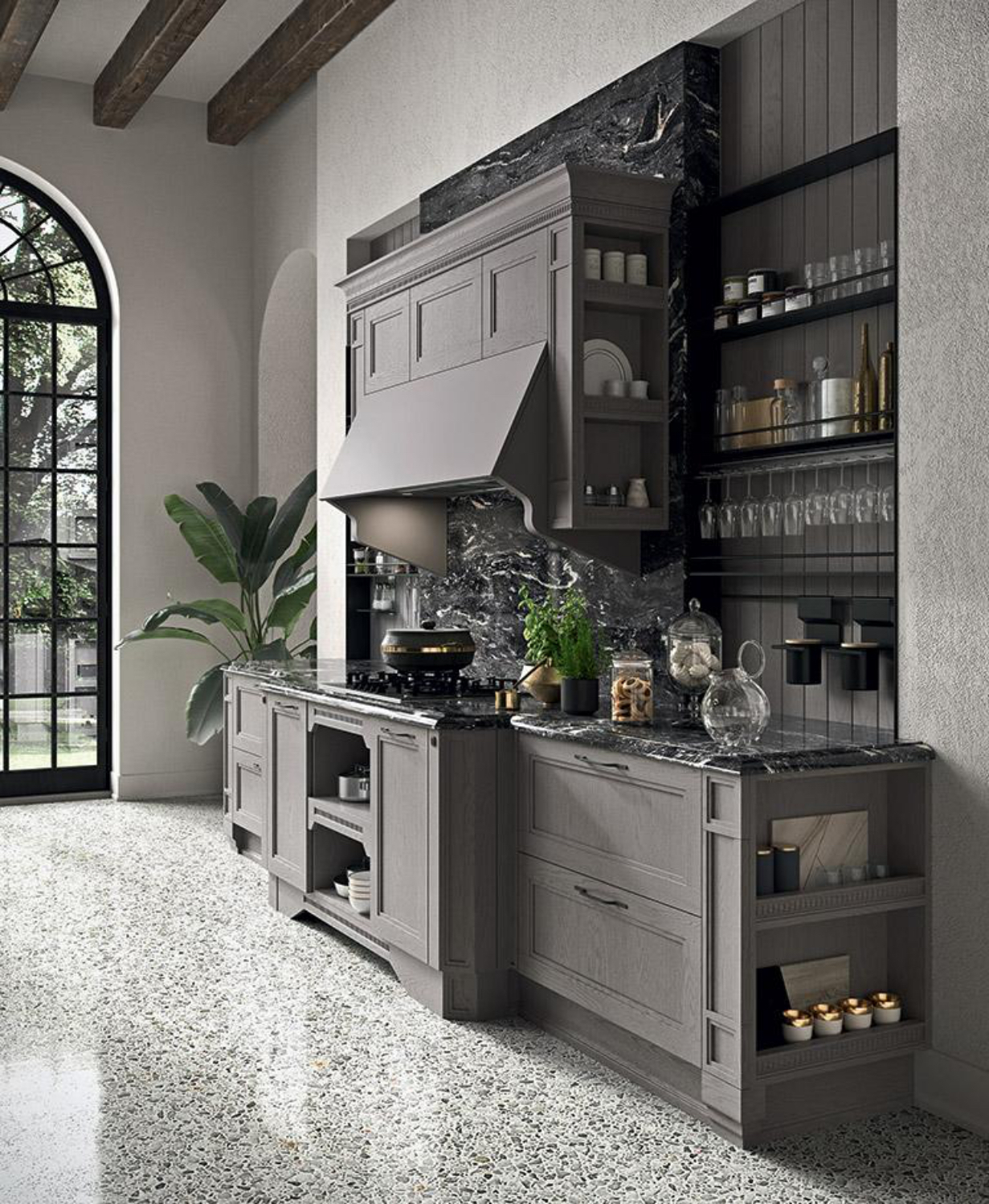
Elite Kitchen, Astra. Granite Countertop
PROS
- Unique material
- Heat resistant
- Scratch resistant
- Low maintenance
- Very durable
CONS
- High cost
- Susceptible to staining if it isn’t periodically sealed
- Very cold material
- Must employ a sealant of high quality and durability
Laminated
Commercial Names (or Types): Abet Laminati, Formica, Lamicolor, Arpa Industriale, Thermopal, Puricelli, Duropal, Resopal.
Laminated countertops are one of the most renowned and utilized options in the kitchen industry due to its numerous benefits. It’s a product of modern technology which counts on a combination of characteristics that offer a rich and deep quality to any kitchen.
Laminates are a material resulting from a basic process where plastic’s resins are laminated over layers of brown kraft paper. Afterwards, a layer of decorative print is added which is ultimately covered with a protective layer of melanin resin. In modern high pressure laminates, plastic resins are impregnated with cellulose layers which solidify under heat and pressure; providing the product a higher degree of heat and scratch resistance.
One of the most recognized advantages is its cost effectiveness and versatility, with numerous options in terms of styles, colors and patterns. The laminate’s plastic resins give this material hydrophobic properties (making it easy to clean) and despite it not being entirely heat or stain resistant, it is still considerably durable over time.
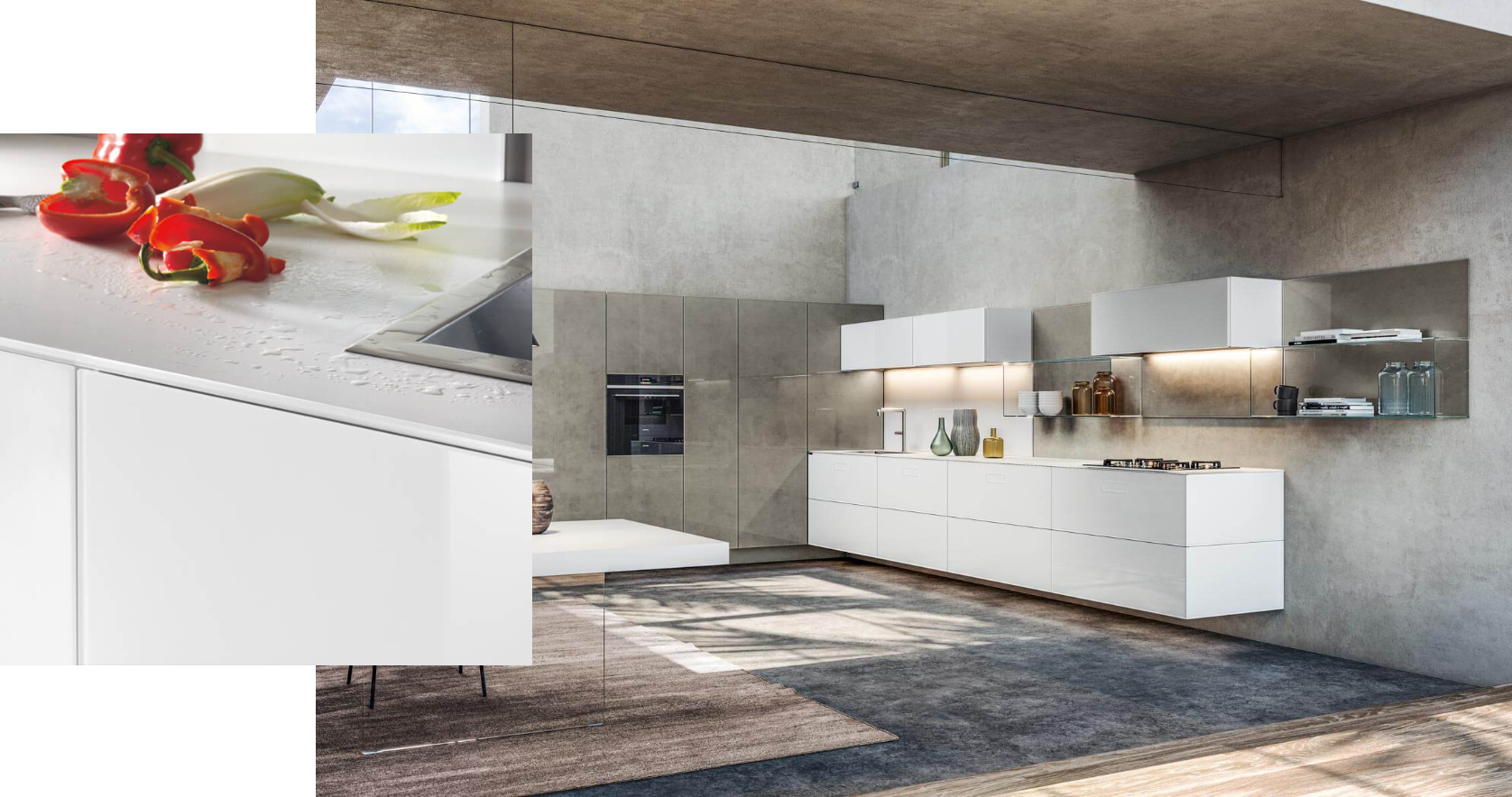
36e8 Glass Kitchen from Lago Design, Laminglass Countertop.
PROS
- Relatively cheap
- Hundreds of colors, patterns and textures to choose from.
- Can be cut in almost any shape
- Easy to install
CONS
- Can be de-laminated over time
- Difficult to repair
- Is susceptible sharp utensils
- Vulnerable to heat and vapor
- Can’t be utilized in exteriors
Marble
Commercial Names (or Types): This material does not have a commercial name as such. Nonetheless, the most employed type of marble is Carrara (with a grey background and lead-grey veins) whose name originates from the Italian region from which it stems. Other equally recognized types of marble are: Calacatta, Statuario, Emperor, Levadia, Black, Giallo Antico, Connemara, Danby and Yule.
Marble has been valued throughout history as the epitome of luxury for its implacable beauty and attractiveness. Nonetheless, its popularity has been slightly diminished by its high level of maintenance and sensitivity in contrast to other materials. It is highly reactive to acids and has a low resistance to abrasions, which means that it is easily and frequently prone to stains and scratches if one isn’t extremely careful. Likewise, it requires a high level of maintenance for it to maintain its appeal throughout the years. This care implies regular sealing, immediately cleaning any spills, avoiding the usage of cutting utensils to prevent scratching, among others; tasks which not everyone can accommodate in their daily tasks.
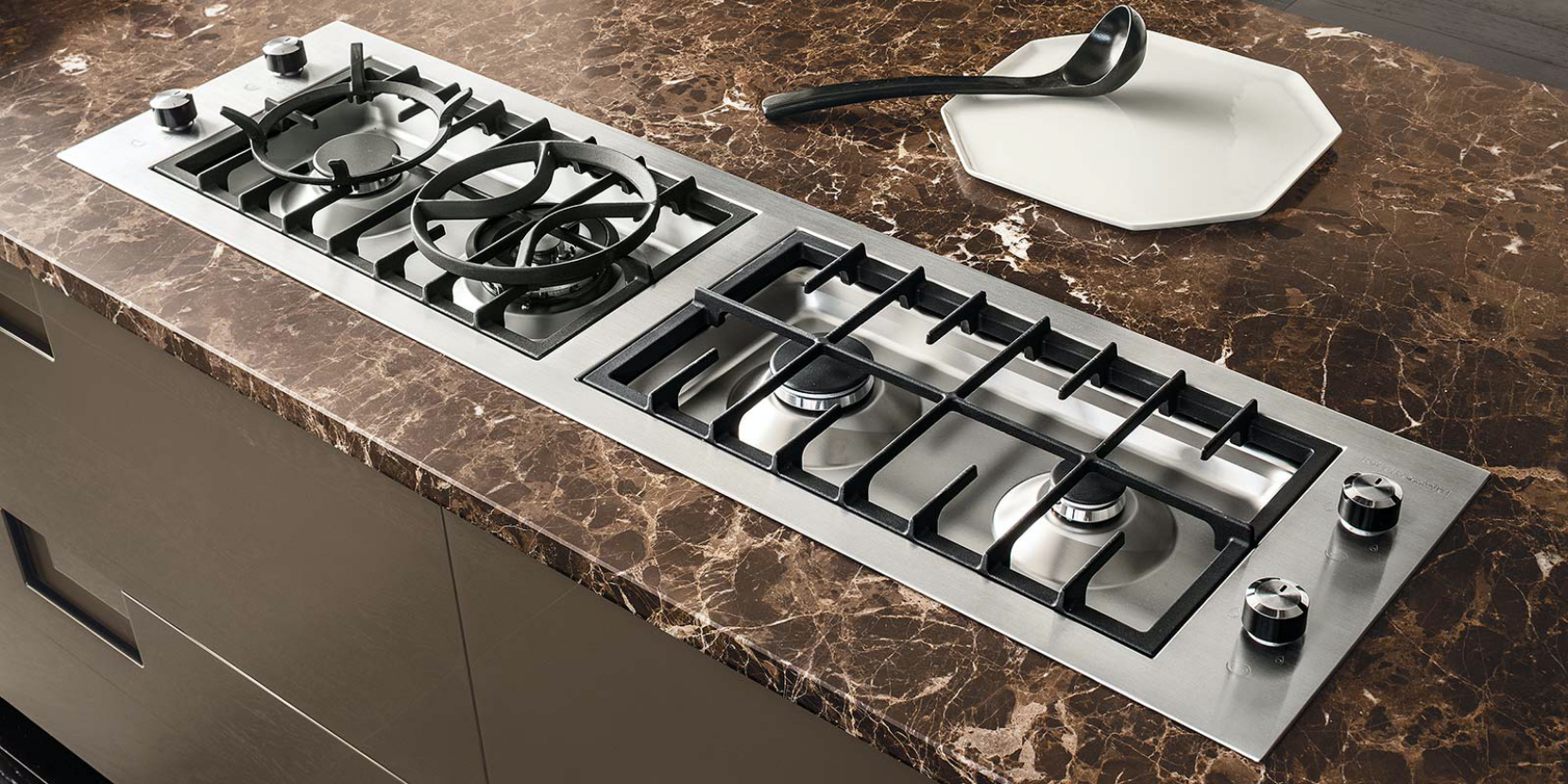
Carre Kitchen, Ernesto Meda: Emperor Marble
Quartz Composite
Commercial Names (or Types): Okite, Zodiaqu, Romaxx, Silestone, Technistone, Caesarstone, Quarella, Santa Margherita, Eco by Consentino, Cristalite, Viatera, Oreolite, Cambria.
If you desire the appeal of natural Stone but with low maintenance, you can select a quartz composite for your kitchen. Also known as “Technical Stone”, it is a man-made material composed of a mixture of components including quartz, glass, marble and binding agents. Quartz, being a more resistant material than marble (in Mohs scale of mineral hardness, quartz has a 7 compared to marble’s 3), is the most commonly used for kitchen countertops, while “marble composed” technical stones are typically used for finishes.
While technical stones are created through a similar process, numerous companies produce their own products with different compositions and percentages, introducing in the market an ample variety of styles and colors.
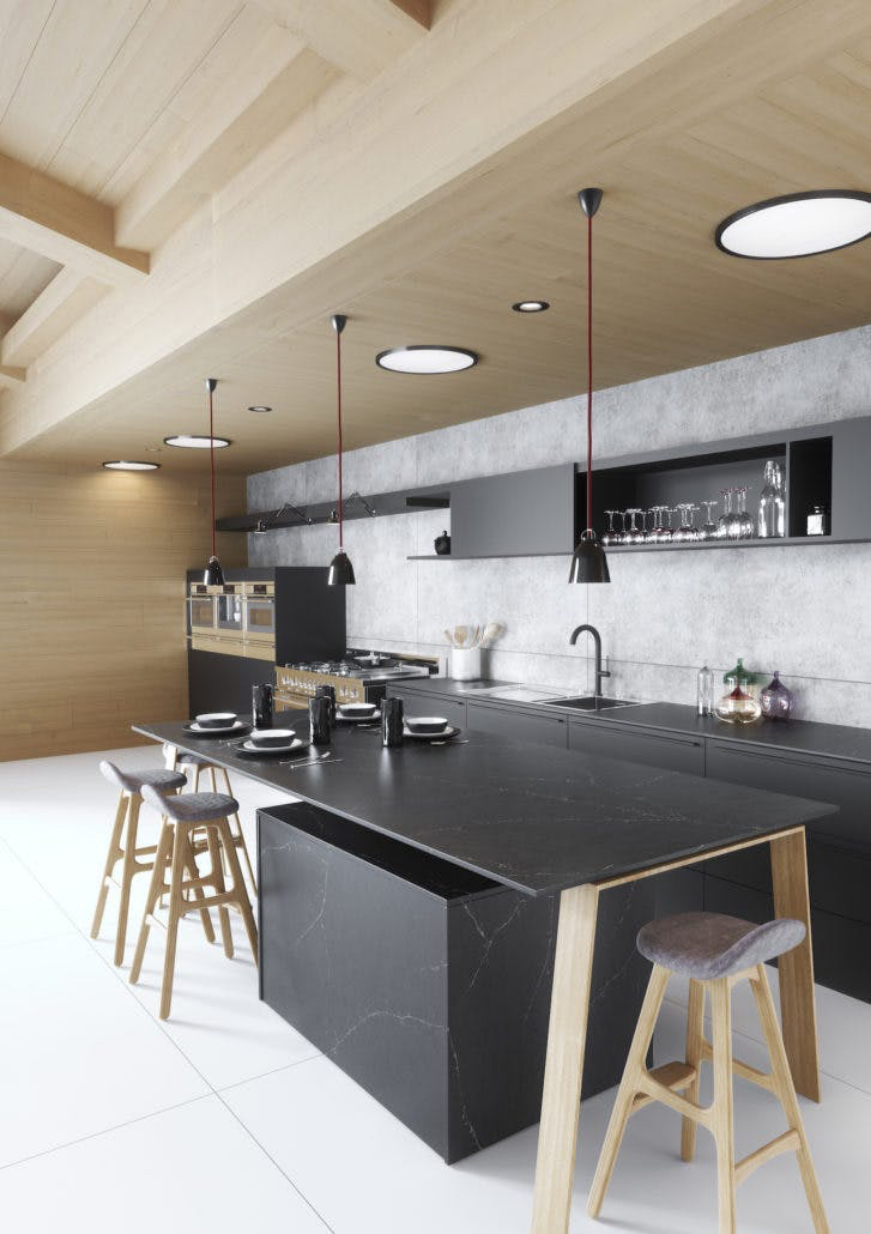
Silestone Countertop, Eternal Charcoal Model
Steel
Commerical Names (or Types): No specific commercial name.
Despite it being an uncommon option, a stainless steel countertop is a distinctive element which provides a unique aesthetic to the kitchen. The appeal of steel is growing in homes thanks to its technical qualities such as its durability and hygiene, as well as the industrial charm it projects; creating an authentic synchrony between the contrast of elegant modernity and the sense of individuality.
For us, the inherent characteristics of the stainless steel countertop gives it a particular distinction compared to other options, including its susceptibility to scratches. These surface imperfections don’t project the idea of a neglected countertop, on the contrary, it gives a homely feel due to the memories that each defect holds.
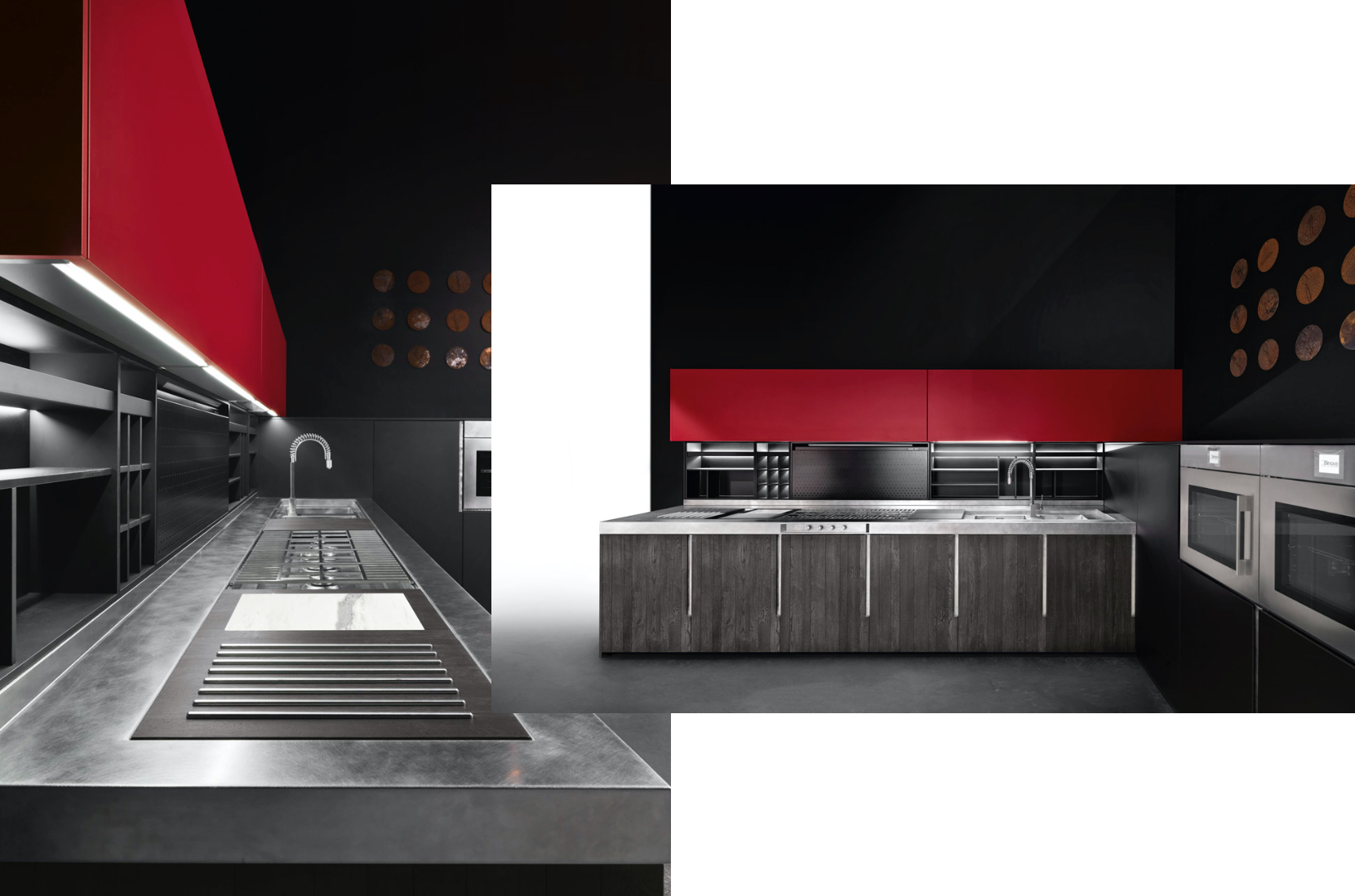
Vogue Kitchen, Binova, Stainless Steel Countertop
Ceramic Surfaces
Commercial Names (or Types): Kerlite, Laminam, Iris, Ariostea, Florim, Lapitec, Dekton
Ceramic or sintered surfaces are man-made materials created from natural components such as glass, porcelain, and quartz. By being subjected to high temperatures and intense pressures, these materials are able to form a compound intensely resistant to abrasions, stains and high temperatures.
Each manufacturer not only has their own recipe to produce this material, but also a unique sintering process. As such, we recommend further in depth research to each available company to find a suitable ceramic surface.
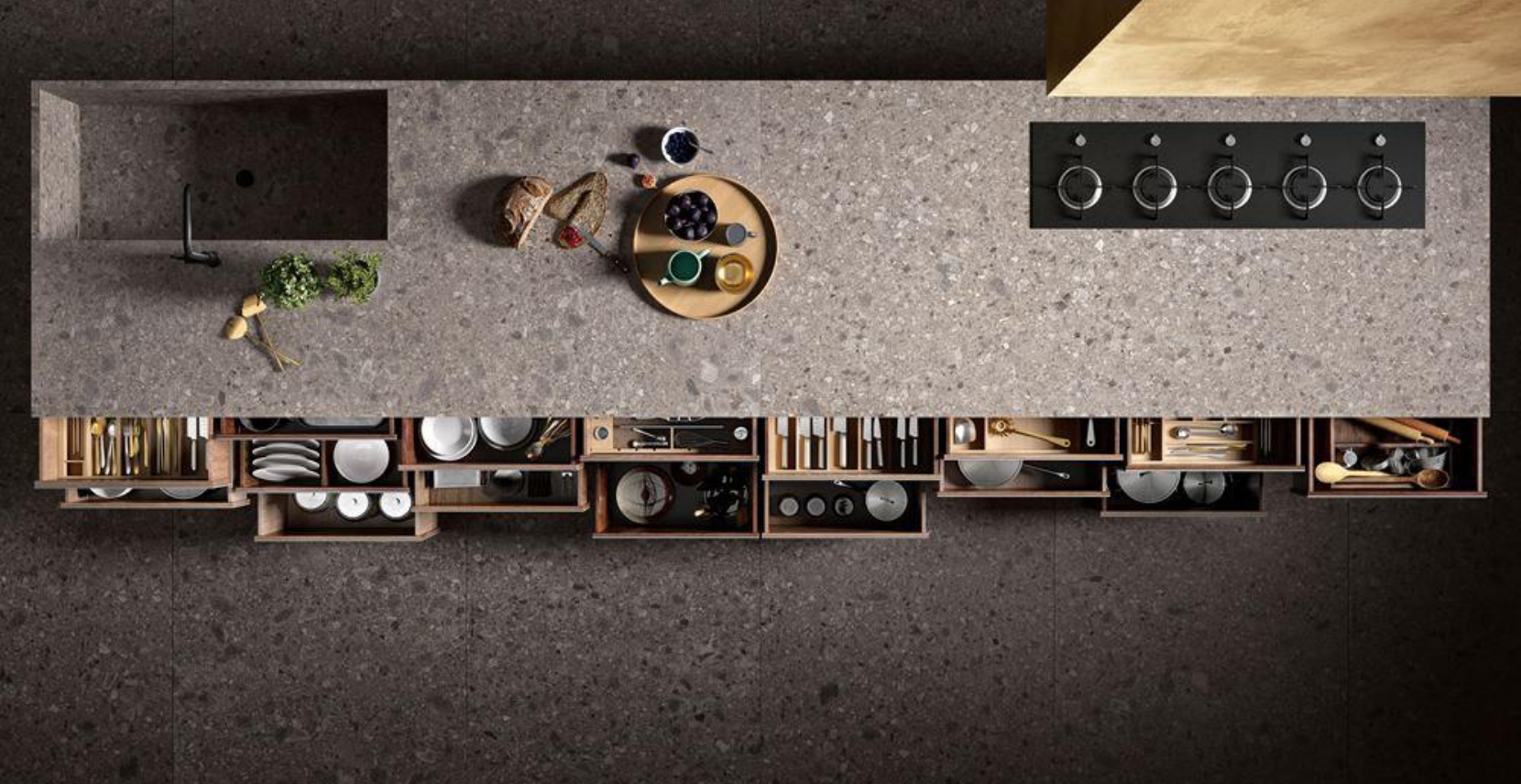
Ceramic Surface Cotto D’Este, Pietra D’Iseo Model
Glass
Glass is one of the most innovative materials in the kitchen countertop market. Not only does it rely on an incomparable aesthetic brought by its reflective shimmer, but also has numerous technical benefits that add an unparalleled value to your kitchen.
After being subjected to a process of heating and cooling, glass possesses a high mechanical resistance which renders it as a very durable and impact-proof. Moreover, glass is 100% recyclable, making it a sustainable addition to your kitchen as well as highly hygienic and easy to maintain. Nonetheless, despite being highly impact-proof, if sharpened objects accidentally pierce into the counter, there can be some splintering or cracking on the surface. Likewise, exposed borders must be treated with care to prevent breakage.
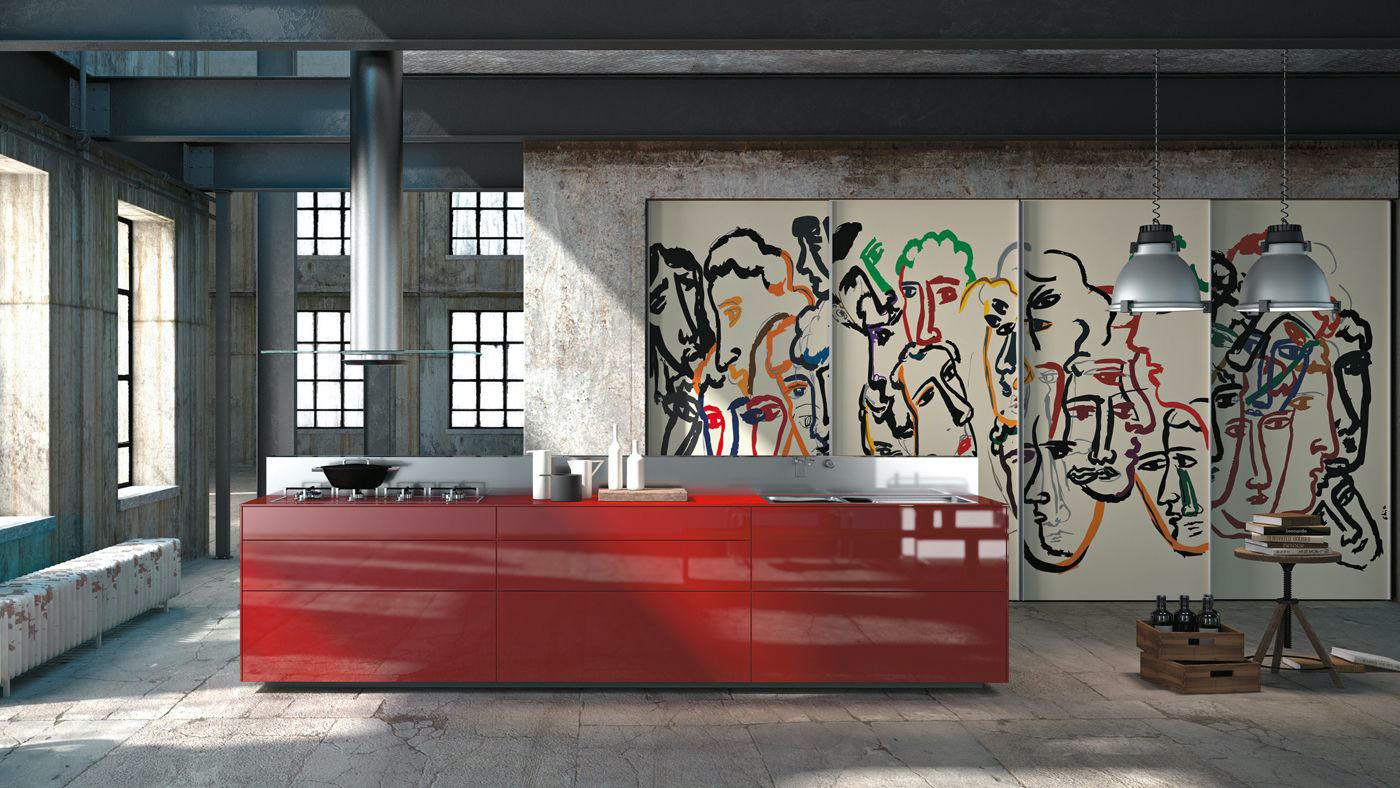
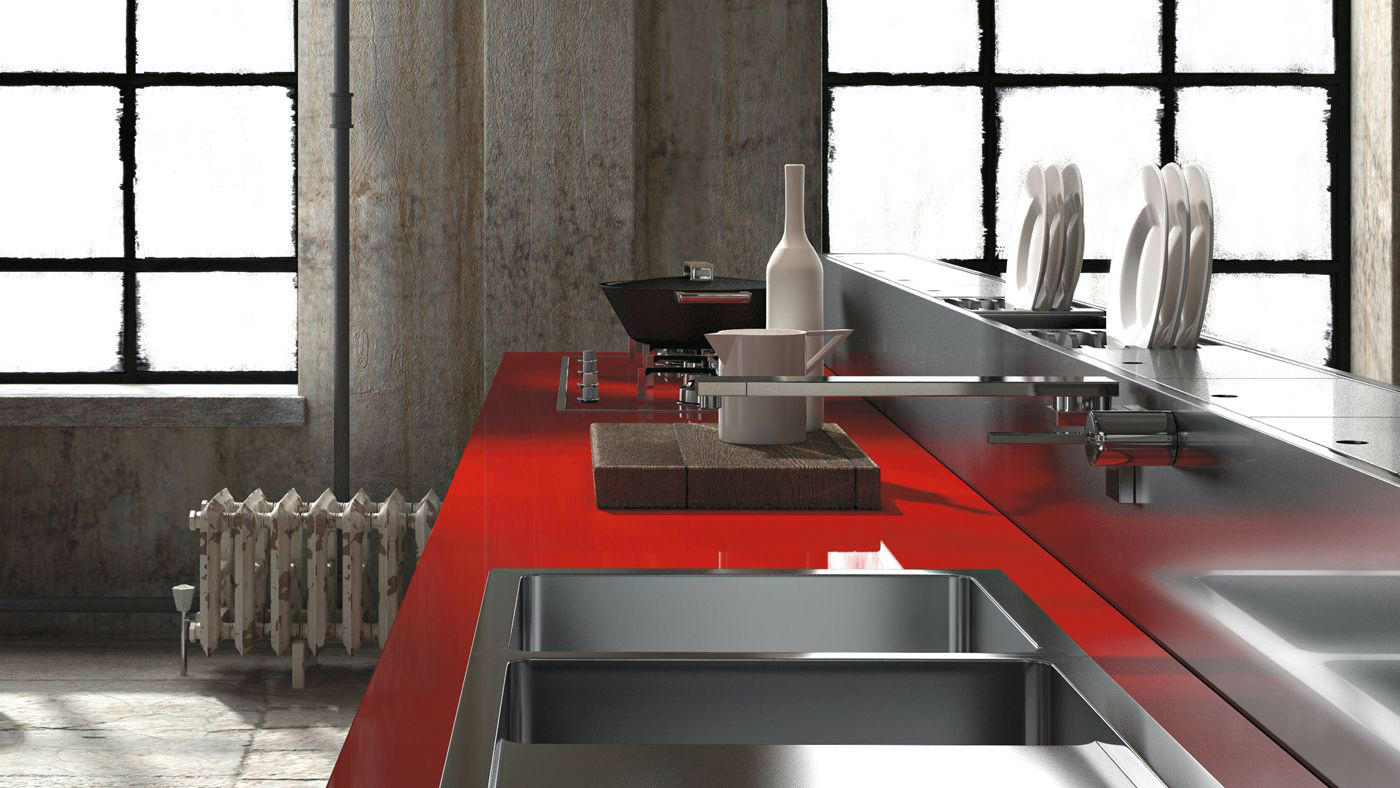
Artematica Vitrum Kitchen, Arte Sandro Chia, Valcucine, Glass Countertop
PROS
- 100% recyclable
- Durable and impact-proof
- Extraordinarily heat resistant
- Not easily stained
- Hostile to bacteria
- Easy maintenance
DESVENTAJAS
- Can splinter or break in the corners
- Acidic substances can stain it
- Texturized glass is difficult to clean
- Is susceptible towards revealing fingerprints and water stains
Solid Surface
Commercial Names (or Types): Corian, Pral, Staron, Hi.macs, Nikron, Delian, GetaCore, Harmony, Policor, Wilsonart, Hanex.
Also known as a compound of acrylic and mineral resin, it’s a mid-range material that is produced with at least 66% of natural minerals mixed with polymer resins, to make it stronger and more resistant than the natural stone from which it’s derived. The idea behind this material’s conception was to obtain a surface with the appeal and technical characteristics of natural stone, without its porosity.
The word solid reinforces the idea that not only is it a stable base, but a homogenous material. This material is incredibly versatile and is growing in popularity among architects and designers thanks to its numerous benefits and properties.
Kitchen One, Ernesto Meda. Countertop from Corian.
PROS
- Hygienic
- Impression of homogeneity throughout material
- Can join laminates without visible joints
- Numerous choices in available markets
- Easy to clean and maintain
CONS
- Vulnerable to sharp utensils
- Not heat-resistant
- Susceptible to abrasive chemicals
With so many options available in the market, selecting the ideal material for your kitchen countertop is an arduous task. With technological advances, materials have changed so radically recently that we are frequently faced with numerous options to choose from. If you seek advice for the design or execution of your project, contact us! We wish to be your ally at the moment of materializing your ideas.
FIND OUT
WHAT’S NEWS
A STUDY IN COLOR
It is uncontroversial to say that one of the most important elements in an effective interior design relies on a meticulously designed color palette.
ATLANTIC 360 RESIDENCES: AN IMPRESSIVE RESIDENTIAL BUILDING EXECUTED BY DESIGN GROUP LATINAMERICA
Located in Eagle Beach, Aruba, Atlantic 360 Residences is a luxurious residential building conceived by Arquitecto Mesce y Asociados for an exclusive group of 27 owners.
THE 10 STAND-OUT EXHIBITIONS OF FUORISALONE 2020
This year, the belated Fuorisalone 2020 returns with brilliant appearances from the most recognized Italian factories globally despite the problems derived from the Covid-19 pandemic. Check out our favorite exhibits!

